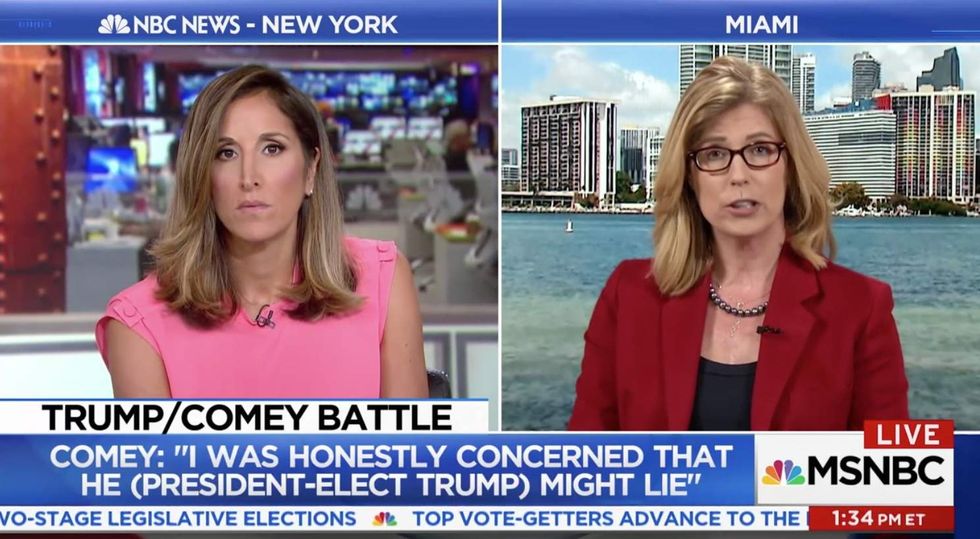
Florida International law professor Elizabeth Price Foley explains on MSNBC why President Donald Trump didn't commit "obstruction of justice" when firing FBI Director James Comey last month. (Image source: MSNBC screenshot)

MSNBC anchor Yasmin Vossoughian and her viewers received a constitutional law lesson at the hands of Florida International University law professor Elizabeth Price Foley on Sunday.
Foley, in just seven minutes, completely dismantled the narrative that President Donald Trump committed obstruction of justice by firing FBI Director James Comey last month.
Democrats and political opponents of Trump have said nearly nonstop for more than a month that Trump committed obstruction of justice by dismissing Comey because Comey’s FBI was in the midst of an investigation into Trump’s presidential campaign.
The FBI has publicly acknowledged an ongoing intelligence investigation into allegations that Trump’s campaign colluded with Russian operatives in last year’s presidential election to undermine the campaign of Democratic candidate Hillary Clinton.
The investigation remains ongoing at the hands of special prosecutor Robert Mueller, though the FBI said last October they had found no evidence of collusion despite a thorough investigation.
But even if Trump had ill motives for firing Comey, Foley unequivocally explained Sunday that firing Comey was well within Trump’s constitutionally defined presidential powers.
“The FBI director works for the attorney general and the attorney general works for the president of the United States. All of these individuals have their jobs by the pleasure of the president’s appointment with the advice and consent of the Senate,” Foley explained. “They can be fired by him at any time and for any reason."
Foley said that one of the most surprising things Comey said during his testimony before the Senate Intelligence Committee last week was his insistence to refer to the FBI as an “independent agency.” As a “legal matter,” Foley said the FBI is not independent and the president, as the head of the executive branch according to Article II of the Constitution, is allowed to direct who or what the FBI investigates.
“If [Trump] is doing something within his constitutional discretionary authority, then he can certainly say, ‘investigate,’ or alternatively, ‘don’t investigate x, y or z,'” Foley said.
She went on to explained:
To the extent that people want try to make this obstruction of justice, there’s a million different layers why this is not technically obstruction of justice, either as a statutory matter or constitutional matter. But this point particularly about a "corrupt intent" is even worse. Because think about it, the president also has the authority under Article II of the Constitution to pardon people, but we don’t say for example that the president can’t pardon a certain person because he has a "corrupt intent," he likes the guy he’s known him for a long time so therefore he can’t pardon him.The pardon power like the power to head the investigative, or the rest of the executive branch like the FBI, like the DOJ is a plenary discretionary authority of the president. He can pardon anybody for any reason he wants to, corrupt purpose or no, and he can direct the investigation or non-investigation of any person corrupt motive or no.
You don’t put discretionary limits on plenary constitutional authority and if you do what you do is you invite Article III non-elected politically non-accountable judges to second guess the president’s authority. You never want to have a constitutional regime that sets up that way.
If people don’t like the actions Trump took with Comey, then Foley explained there are two "political pushback mechanisms” that people can take: impeach the president and remove him from office or vote someone different into office in 2020.
While its not yet known what Trump’s re-election chances are, given there are more than three years until the next presidential election, impeaching Trump and removing him from office would prove be a very difficult task.
Only two previous president have been impeached: President Bill Clinton in 1998 and President Andrew Johnson in 1868.
Both were later acquitted by the Senate.